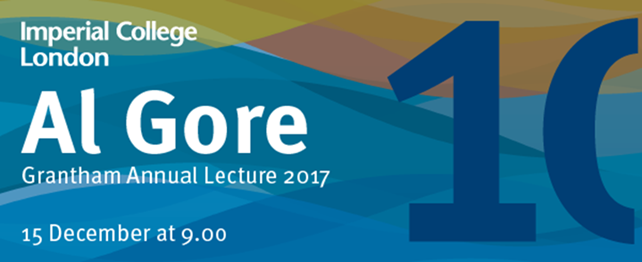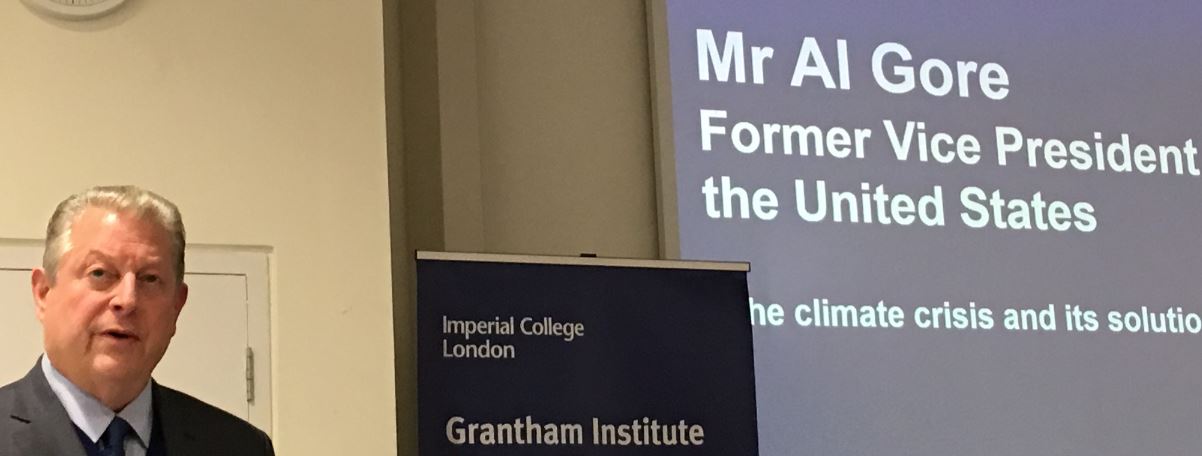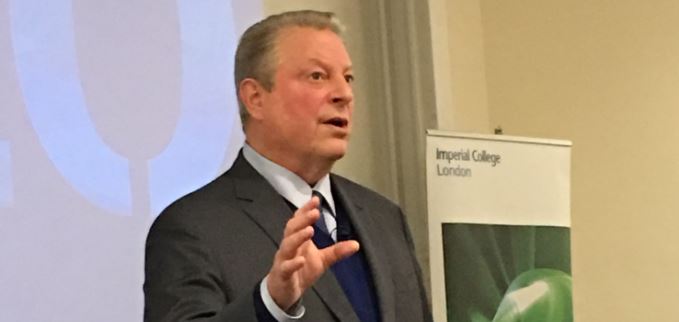Still Inconvenient, Still True
I had the great privilege of receiving an invitation from the Grantham Centre to attend a lecture by Al Gore to mark the Centre’s 10th anniversary at Imperial College London. This post is a summary of some of the key points of the lecture, which was delivered to a packed hall and live-streamed to other parts of the campus. Mr Gore, who really needs no introduction to people who read blog posts written by sustainability practitioners, started his talk with some background about the challenges faced by human society and the natural environment, both in terms of the physical impacts and the political impact of those with a vested (financial) interest in the current system.

He described mankind as using the atmosphere as ‘an open sewer’ and listed a range of events attributable in whole or in part to rising levels of atmospheric carbon dioxide. Mid-winter Californian wildfires raging now, floods in Texas caused by hurricanes of unprecedented strength and other events across the globe surely provide irrefutable evidence of change, so why is there so little concern from the public at large? In the US, at least, he attributes a large part of this to the lack of media coverage. Research by Media Matters found that in 2016 the combined climate coverage on ABC, CBS and NBC evening news programmes and Fox News Sunday (Fox apparently only does news on a weekly basis) was just 50 minutes.
Yes, you read that right. Less than an hour. In total.
70% of US citizens know climate change is real and nearly as many know it is manmade, but very few support immediate action. It is not made as urgent to them as all the things that the media DO choose to cover.
The introduction ended with three questions; “must we change?”, “can we change?” and “will we change?”.

Must we change?
If you’re reading this blog it is a reasonable assumption that you’re not in denial about climate change or the part played in it by human activity. You will know that the weather events listed above are far from the only results of a changing climate. The lecture include examples of others some of which are included here. UN figures show that there are 30m people on the brink of starvation in Africa; climate change in the Eastern Mediterranean played a significant part in the problems in Syria well before the advent of the civil war; climate refugee numbers are predicted by some to reach 1bn by 2100. The 6th ‘great extinction’ is believed by many biologists to be the most significant impact of climate change is happening around us. The world is at risk of losing half of all land and sea species within this century. On average, land flora and fauna are moving towards the poles at a rate of 4.5m per day.
The impacts are economic as well as environmental. $22 trillion in carbon assets is at risk of being stranded, which was compared to the sub-prime mortgage scandal that triggered the financial collapse of 2008 (on a side note, if you haven’t seen The Big Short, it’s well worth watching). Within the past few weeks the Norwegian sovereign wealth fund (ironically derived mostly from oil and gas) has declared it will take its holding of fossil fuels down to zero.
Can we change?
There are changes happening the world over that indicate the possibility of a transition to a low- or even zero-carbon economy. Global investment in renewable energy surpassed global investment in fossil energy seven years ago and has increasingly outpaced it each year since. Research by the Grantham Centre projects global coal and oil use will peak in 2020. Improvements in battery storage by Tesla and others are bringing closer the day when solar and wind energy can be used when the sun isn’t shining or the wind isn’t blowing. India has announced that all new cars and trucks will have to be electric by 2030. Efficiency improvements are being made in all spheres of human endeavour, which are the core of a new Sustainability Revolution, which has the scope for change of the original Industrial Revolution but will move at the speed of the Digital Revolution. Tools such as the Internet of Things and machine learning, whilst in my opinion not without their own challenges, will transform a whole range of sectors.

Will we change?
All 197 nations of the world signed the Paris Accord of net-zero emissions by 2050 or as soon thereafter as possible, with the only 2 original ‘hold-outs’ (Syria and Nicaragua) signing in November 2017. The withdrawal of the USA may have been a factor in this but, legal barriers to the timing of said withdrawal notwithstanding, individual US states, cities and business leaders have collectively committed to action which is generally viewed as being sufficient to deliver the US contribution whatever may or may not be done by the US Federal government.
This year’s Conference of the Parties (COP) in Bonn provided further evidence and next year’s, in Warsaw, will begin the review process. Existing and expected future technological improvements mean that nations are now looking at where the cost of renewables will be in future. The ratings firm Moody’s has announced that it will downgrade the bond ratings of municipalities which do not fully prepare for the consequences of climate change. Some insurance companies no longer provide insurance to fossil-fuel-burning facilities. Employment is moving out of engineering businesses reliant on the burning of fossil fuels, even outside coal.
With this evidence, Mr Gore is optimistic that the climate crisis can be weathered (pun intended). In response to a question from the audience about the innovation he would most like to see, he said that it would be a mistake to rely on new technology as it might lead people to delay their actions (see the point above on how people can find ways to ignore reality). In response to another question on what we can all do, his advice was simple; speak up in normal conversations and make your vote count. Something we can all do.